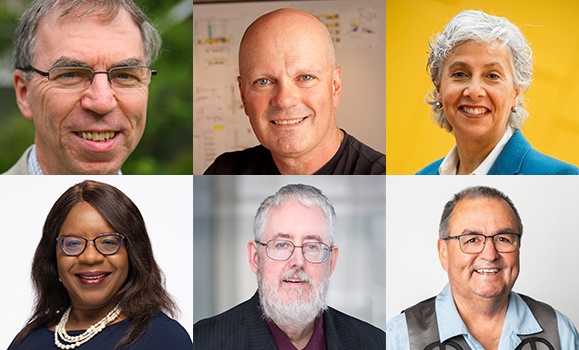Science, architecture, economic development, medicine, technology — each of these fields has become richer due to the contributions of the six individuals being presented with honorary degrees at this year's Spring Convocation ceremonies.
Through the awarding of honorary degrees, the university's highest honour, Dalhousie recognizes individuals who've demonstrated inspirational leadership in, or in service to, society, outstanding contribution to a field or discipline, and/or outstanding contributions to the university.
Their accomplishments and achievements are meant to inspire graduates and reflect the character and values of the university.
Honorary degree presentations will take place at six of the 19 Convocation ceremonies at Dalhousie this spring. Proceedings begin on Tuesday, May 21 and run through Friday May 31.
For more information, visit the Convocation website.
Dr. Austin Mardon
Author, Explorer, Advocate
Friday, May 31 (12:30 p.m. ceremony — Faculty of Science)
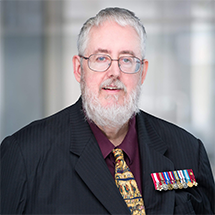
Dr. Austin Mardon is a polymathic explorer whose commitment to the fields of astronomy, geography, political history, theology, and medicine, and his mental health activism, have had far-reaching impacts. Born in Edmonton, Alberta, and growing up in Lethbridge, Dr. Mardon completed undergraduate studies in geography at University of Lethbridge and soon headed south — 170 miles from the South Pole as part of an Antarctic meteorite expedition for NASA and the National Science Foundation. Medical complications from environmental exposure on the trip earned him an Antarctic Service Medal but curtailed his aspirations of heading to space.
Dr. Mardon’s earthly ambitions were undeterred, however. He went on to earn master’s degrees in education and science, and his PhD in geography from the University of Greenwich in Australia. In the mid-1980s he started the Antarctic Institute of Canada, a non-profit promoting research and exploration, of which he is still the director. He’s authored upwards of 500 articles and books. After his 1992 schizophrenia diagnosis, Dr. Mardon became an advocate for people experiencing mental illness, writing numerous books on the subject and receiving the Canadian Medical Association Medal of Honour.
A Member of the Order of Canada, the Royal Society of Canada and the Royal Geographical Society of Canada, he currently holds adjunct professorships at the University of Lethbridge and in the University of Alberta Department of Psychiatry — the first time someone with schizophrenia has been appointed to such a position. He lives in Edmonton with his wife and frequent collaborator, Dr. Catherine Mardon.
Brian MacKay-Lyons
Global excellence in design and architecture
Wednesday, May 22 (9:00 a.m. ceremony — Faculty of Architecture & Planning)
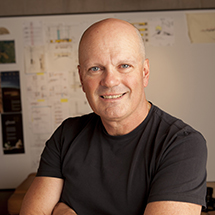 Our built surroundings are more than just shelters comprising a roof and four walls — they can be an expression of place, of material, of culture. This is rarely more evident than it is in the work of Professor Brian MacKay-Lyons, whose world-renowned designs pay homage to the vernacular building styles of the Atlantic region.
Our built surroundings are more than just shelters comprising a roof and four walls — they can be an expression of place, of material, of culture. This is rarely more evident than it is in the work of Professor Brian MacKay-Lyons, whose world-renowned designs pay homage to the vernacular building styles of the Atlantic region.
Prof. MacKay-Lyons was born in the Nova Scotian village of Arcadia and earned his Bachelor of Architecture from the Technical University of Nova Scotia (now Dal’s Faculty of Architecture & Planning) in 1978. He went on to study extensively abroad—including in the United States, Italy, China, and Japan—but felt drawn to return to his home province to combat the “brain drain” and contribute to the local culture in a meaningful way. Since 1985, the practice first of MacKay-Lyons Architecture Urban Design, which eventually became MacKay-Lyons Sweetapple, has embodied design excellence, winning over 160 awards and featured in over 100 exhibitions internationally. Prof. MacKay-Lyons also taught architecture at Dalhousie for nearly four decades, holding 18 endowed academic chairs. His famous Ghost Lab, which ran from 1994 to 2011, served as a different kind of architecture school on his family farm — an experimental retreat and meeting place for an international group of architects who shared a commitment to landscape, making, and community.
Prof. MacKay-Lyons’s awards and honours include the Royal Architectural Institute of Canada Gold Medal — the top award in Canada for lifetime contribution in architecture. He is a Fellow of the Royal Architectural Institute of Canada and the Royal Canadian Academy of Arts, an International Fellow of the Royal Institute of British Architects, and a Member of the Order of Canada.
Dr. Estella Atekwana
Ground-breaking geophysicist and mentor
Friday, May 31 (9:00 a.m. ceremony — Faculty of Science)
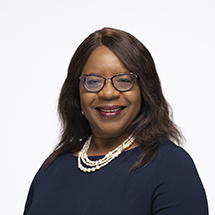 Dr. Estella Atekwana once described her pioneering work in biogeophysics — the study of how plants, microbes, and other organisms effect the make-up of the earth — as “discovered by accident and developed by serendipity.” But her contributions to the earth sciences, as well her impact on her students and colleagues, are certainly no accident but, rather, the result of her vision, dedication, and leadership.
Dr. Estella Atekwana once described her pioneering work in biogeophysics — the study of how plants, microbes, and other organisms effect the make-up of the earth — as “discovered by accident and developed by serendipity.” But her contributions to the earth sciences, as well her impact on her students and colleagues, are certainly no accident but, rather, the result of her vision, dedication, and leadership.
Dr. Atekwana, who grew up in Cameroon, is a Dalhousie PhD graduate in Geophysics who came to Halifax after her bachelor’s and master’s studies at Howard University in Washington, DC. She is currently dean of the largest college at UC Davis, the College of Letters and Science, where she endeavours to ensure success for 16,000 students across 37 departments and academic programs. Her extensive work in tectonics, near-surface geophysics, and biogeophysics has allowed her to contribute more than 150 papers, 134 peer-reviewed articles, two books, and more than 270 conference papers to the scholarly record. Demonstrating her deep commitment to equity, diversity, inclusion, and student success, she has advised and mentored women and underrepresented minority students, as well as early-career academics, on navigating their studies and careers in STEM.
A Fellow of the American Geophysical Union and the Geological Society of America, Dr. Atekwana has received accolades not only for her groundbreaking scientific work, but for her teaching as well. She received the 2020 Society of Exploration Geophysicists (SEG) Global Virtual Lecturer award, and Outstanding Educator awards from both the SEG and the Association for Women Geoscientists.
John G. Paul
Leader and agent of change
Wednesday, May 22 (4:00 p.m. ceremony — Faculty of Management)
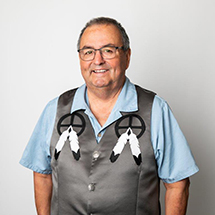 Over the past three decades John G. Paul has been instrumental in providing services, policy, and administrative support for 33 First Nation communities across Mi’kma’ki. His accomplished career has been defined by his work as a dedicated champion, leader, and advocate for Indigenous communities throughout Nova Scotia and beyond.
Over the past three decades John G. Paul has been instrumental in providing services, policy, and administrative support for 33 First Nation communities across Mi’kma’ki. His accomplished career has been defined by his work as a dedicated champion, leader, and advocate for Indigenous communities throughout Nova Scotia and beyond.
Mr. Paul was raised in Membertou on Unama’ki/Cape Breton Island. In 1980, he graduated with his Bachelor’s in Community Studies from Cape Breton University (CBU) before going on to earn his Master’s in Public Administration in Financial Management from Dalhousie. He began his career in his own community in Membertou, working in administration and economic development before turning toward work for the Atlantic Policy Congress of First Nations Chiefs Secretariat. There, Mr. Paul co-created the Atlantic Aboriginal Economic Development Integrated Research Program, a collaboration with 15 of the Atlantic region’s academic institutions, including Dalhousie. He was instrumental in changing the electoral process for Chief and Council through the First Nation Election Act, proclaimed in 2014. He also helped to develop the Atlantic First Nations Water Authority, furthering Indigenous self-determination and working to protect a resource that is critical to the health and well-being of communities and the environment.
Mr. Paul has on the Board of Governors of First Nations University of Canada in Regina and of CBU, and he has served on numerous national committees with both the federal government and the Assembly of First Nations in such diverse areas as fiscal relations, economic development, health services, fisheries, education, land claims, and many others.
Dr. Michael Gray
Paradigm-shifting biochemist
Tuesday, May 28 (9:00 a.m. ceremony — Faculty of Medicine)
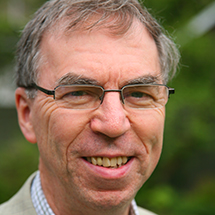
Dr. Gray began his career in biochemistry in 1962 at the University of Alberta, where he first earned his undergraduate degree, swiftly followed by his PhD. After postdoctoral work at Stanford University, he accepted a position at Dalhousie in 1970 where he remained until his retirement in 2008. During that time, he published nearly 300 papers, with his work being cited more than 24,000 times. He is known as an effective collaborator and leader who has stewarded the graduate work of many stellar students. He was instrumental in helping to establish Dal’s Centre for Comparative Genomics & Evolutionary Bioinformatics and led two pan-Canadian DNA sequencing projects for Genome Canada, where he was also Chair of the Science and Industry Advisory Committee.
Dr. Gray is an elected Fellow of the Royal Society of Canada, the American Academy of Microbiology, and the American Association for the Advancement of Science. He was also the Canada Research Chair in Genomics and Genome Evolution from 2001 to 2008. He was inducted into Sigma Chi, The Scientific Honor Society, in 2024.
Dr. Una-May O’Reilly
Computer science trailblazer
Thursday, May 30 (12:30 p.m. ceremony — Faculty of Computer Science)
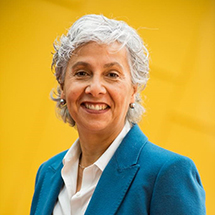 What do the optimal layout of turbines in a wind farm, the frequencies and characteristics of the heartbeats of thousands of cardiac patients, and IRS tax records all have in common? They may appear as collections of data points almost too large to handle, an information overload. But for Dr. Una-May O’Reilly, a world-leading computer scientist in the field of evolutionary computation, they’re an opportunity to help us solve some of the world’s big problems.
What do the optimal layout of turbines in a wind farm, the frequencies and characteristics of the heartbeats of thousands of cardiac patients, and IRS tax records all have in common? They may appear as collections of data points almost too large to handle, an information overload. But for Dr. Una-May O’Reilly, a world-leading computer scientist in the field of evolutionary computation, they’re an opportunity to help us solve some of the world’s big problems.
At MIT, Dr. O’Reilly heads a group within the Computer Science & Artificial Intelligence Laboratory that applies tenets of biological evolution to machine learning. Their projects include cyber security, clinical medicine knowledge discovery, and educational data mining, among others. She has served as chair of the largest international evolutionary computation conference, the Genetic and Evolutionary Computation Conference (GECCO), and in 2013 won the EvoStar Award for Outstanding Achievements in Evolutionary Computation.
In a field where women still tend to be underrepresented, Dr. O’Reilly, who has been at MIT since 1996, is described as an “energetic trailblazer” who endeavours to pave the way for future women computer scientists. She is cofounder of the Women in Evolutionary Computation Group for GECCO, a place where students and junior researchers from under-represented cohorts can come together to connect with those established in the field, and she’s appeared on PBS’s SciGirls, a program aimed at inspiring young girls to learn about science and tech. She holds a BSc from the University of Calgary, and a master’s in computer science and a PhD from Carleton University in Ottawa.

